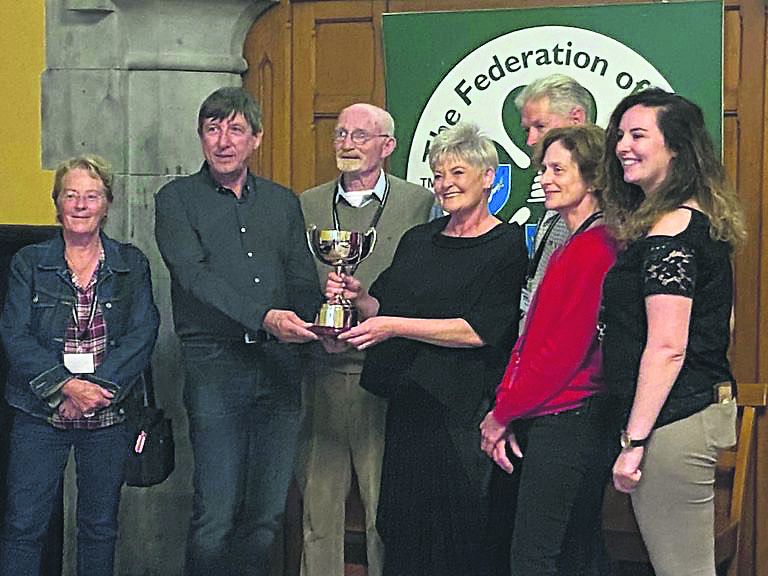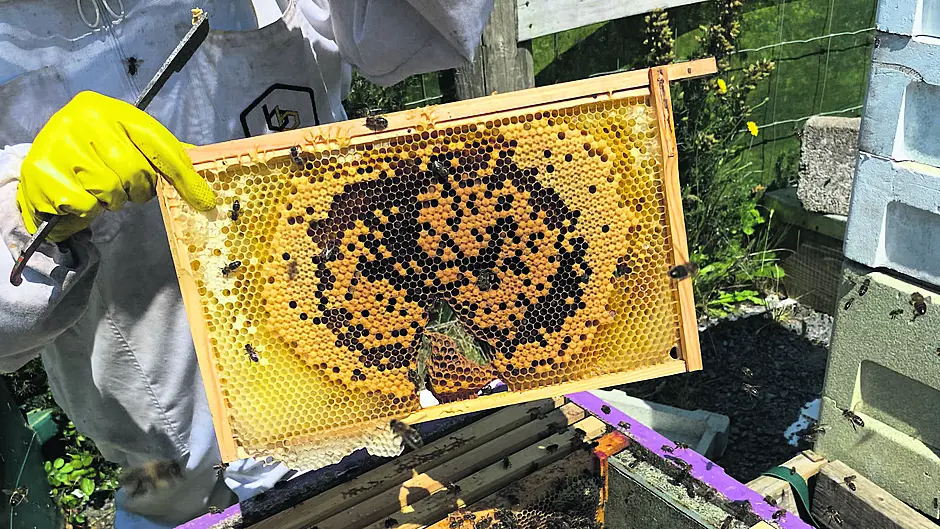A THRIVING bee-keeping community in West Cork has officially opened a demonstration apiary.
Environmentalist Eanna Ní Lamhna was the guest of honour to cut the tape on the apiary, which is located Schull in Goleen parish. The Fastnet Area Beekeepers Association (FABKA) have come a long way since their founding four years ago by Mairead and Michael Love. From those small beginnings, the association now has more than 80 members.
The demonstration apiary is an important step. ‘We’re very lucky that local farmer Peter Hunt has allowed us to use his land for this apiary,’ says FABKA co-founder and education officer Mairead.
‘It’s located near a lake, and some of the birds in the area are on ‘amber’ conservation list. It’s a very special place and it’s magnificent.’
Birdwatch Ireland was represented at the opening along with John Greenaway, director of the voluntary conservation areas for the Native Irish Bee, sometimes known as the black bee.
FABKA are keen to keep that purity in its bees. ‘It’s an ideal place to keep bees on the peninsula because there are no other bees. We’ve tested our bees and they are 98.5% pure.’
Bee keeping was a slow-burning love for Mairead.
‘When I was growing up, I used to hate bees and everything to do with them,’ says Mairead who is originally from Stradbally in Co Laois. ‘My father was from West Cork and used to keep bees but I hated them.’ When she was in her 30s, she got a change of heart, and started keeping bees.
She met and married husband Michael Love from Goleen.
In the 1990s, the varroa mite threatened to devastate Irish bee colonies with many colonies not surviving with out the use of medication, and it brought home to her the importance of conserving the Irish honeybee.
‘I think I went from keeping bees, to being a bee keeper,’ she says. ‘There’s a big difference between.’
Mairead says locally sourced honey has a very different and superior flavour to the blended honeys which are more widely available in supermarkets, which are combined with honey from outside Ireland.
The honey coming from FABKA in West Cork is a floral honey, which gets much of its flavour from the environment and pollenating flowers which the bees encounter – white clover, bramble, gorse, willow.
‘It’s sweet, it’s beautifully scented, and has a very high viscosity,’ says Mairead. ‘The honey that is best for you is local honey.’
Those delicate flavours wowed judges at last year’s Federation of Irish Beekeepers Associations’ (FIBKA) awards.
Mairead took home the supreme honey award at the National Honey Show at Maynooth, along with three class prizes. FABKA also scooped the Best Federation Association Award, while FABKA member Mary Downey from Goleen won the Best Novice Honey Award.
FABKA holds introductory courses for €150, which consist of six lectures, a guide book, practical demonstrations, and events, and most importantly the benefit of shared knowledge from being part of the association. This year’s courses have already reached maximum capacity.
The demonstration apiary in Goleen will be abuzz with activity in the years and months to come.
Maynooth hosts honey show
 FABKA's Mary Downey, Paul O Brien, Michael Love, Mairead Love, Mark Newenham, Felicity Callahan, Amanda O Donovan at last year's national awards, where they won the prize for best association.
FABKA's Mary Downey, Paul O Brien, Michael Love, Mairead Love, Mark Newenham, Felicity Callahan, Amanda O Donovan at last year's national awards, where they won the prize for best association.
BEEKEEPING in Ireland is enjoying a renaissance but it is far from a new pursuit.
The Federation of Irish Beekeepers’ Associations (FIBKA) was originally founded in 1881 and is Ireland’s largest beekeeping organisation, representing more than 3,000 beekeepers belonging from 40 local associations across the island of Ireland.
On Friday July 28th and Saturday July 29th, FIBKA will hold its annual Beekeeping Summer School and National Honey Show, this year taking place at Maynooth University. This will be the 75th running of the show. The event includes lectures, workshops, exhibitions, with the highlight being the Irish National Honey Show, sponsored by Bord Bia, with various classes of honey competing.
Last year Fastnet Area Beekeepers Association won the Best Federation Association Award, while Goleen beekeeper and FABKA member Mary Downey won the Best Novice Honey Award. Mairead Love was a winner in three classes: 3 Jars of Light Honey Class, 12 Jars for Sale Class; and The Moulded Bees Wax Candle Class.








